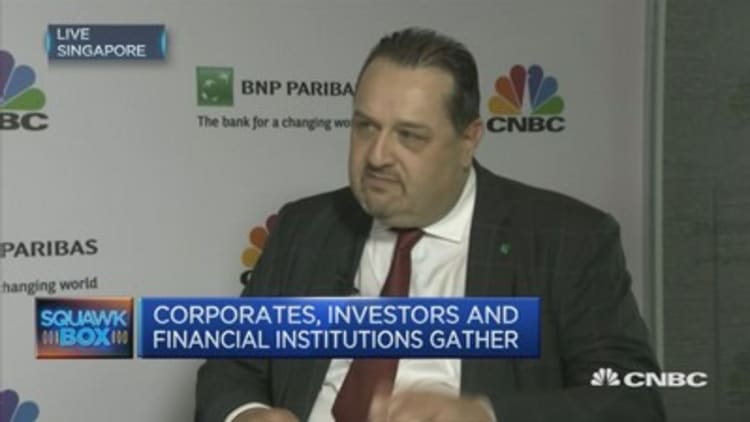In one of its latest efforts to raise funds, Singaporean real estate developer City Developments Limited issued a green bond — a fixed income product with proceeds used to finance projects or activities that help the environment.
"Green financing offers us an alternative financing stream. There is an increased interest in socially responsible investments and a growing demand for relevant products," Sherman Kwek, CDL's deputy chief executive, said in a statement earlier this month.
The company's issuance, which raised 100 million Singapore dollars ($71.1 million), is the first in Singapore as the Southeast Asian city state seeks to grow its marketplace for sustainability-oriented investments.

Such products, though not new in the finance world, saw demand rise at a faster pace after the Paris climate change agreement was reached in December 2015. The accord, which came into effect in November 2016, will see nearly 200 countries work to reduce greenhouse gas emissions with the aim of containing climate change.
Moody's Investors Service said in January this year that green bond issuance rose 120 percent in 2016 to a record $93.4 billion, and it has the potential to hit $206 billion in 2017.
Reflecting the wider global appetite for green investment products, commonly known as sustainable or impact investments, a report published last month by the Global Sustainable Investment Alliance (GSIA) showed that socially responsible assets under management grew to $22.9 trillion at the start of 2016, 25 percent more than 2014. Such assets account for 26.3 percent of total managed assets.
Industry players interviewed by CNBC said global investors are increasingly considering environment, social and governance (known in the industry as ESG) factors. That shift comes alongside growing awareness of climate issues — from the melting Arctic ice caps to Southeast Asia's trans-boundary haze pollution.
"Impact investing makes sense to investors because it allows them to diversify their portfolios with a new asset class… As years pass and more actors are participating in impact investing, this inspiration is paired with results that show that positive impact can be generated alongside financial returns," said Durren Shahnaz, founder of Impact Investment Exchange, a platform that helps social enterprises raise funds.
As environmental and social development issues continue to dominate headlines, tighter regulations have come into force, requiring companies to be more transparent about their commercial activities and to improve governance standards, the interviewees said.
Legislation plays a big part in promoting sustainable investing in Europe, the region that is leading the pack with $12 trillion worth of assets under management. That represents 52.6 percent of total assets held by European firms, according to the GSIA report.
"The Nordics are certainly leading the way in terms of ESG integration. The U.K. and the remainder of continental Europe are also fairly advanced," said Eric Cockshutt, head of responsible investment of Swiss asset manager Unigestion, offering the example of French legislation that requires pension plans to disclose the carbon footprint of their holdings.
Asian firms, meanwhile, have less than 5 percent of their holdings — $526 billion — in sustainable assets. The region offers significant growth opportunity as pollution issues have raised awareness of the impact that companies' value chains can have on the environment, said Arnout van Rijn, chief investment officer at Robeco Asia Pacific.
"Across this region the landscape is beginning to change too, in part driven by the increasing awareness of the massive capital needed to finance the region's transition to a low-carbon future… In China there is a remarkably active interest for the topic among the large institutions," he said.
The business case for sustainable investing
Van Rijn said there is a growing body of academic research, such as a 2015 study out of the Hong Kong University of Science and Technology, which found that sustainability-themed investments perform just as well, if not better, than competing products without a sustainability element.
"Various studies theorize that firms that adhere to sustainability principles should outperform those that do not because they prioritize long-term corporate objectives over short-term profits. This allows them to enjoy more stable earnings growth and less downside volatility," he said.
"However, if investors focus too much on the quarterly earnings or short-term performance and pay less attention to long-term strategies, companies are discouraged from investing in sustainable practice that could benefit them in the long-term."
Taking into account sustainability aspects in investment decisions also helps investors identify risks that may not be adequately factored into the product's price, said Cockshutt.
"The net result is side-stepping holdings that may cause large unexpected drawdowns. So while some argue that any time you exclude securities from your investment universe you must forgo performance, our counter-argument is that you can outperform by managing risks," he added.
For companies, incorporating sustainable practices in commercial activities and governance could open up new market opportunities. A report by Business and Sustainable Development Commission released in January noted that companies could unlock $12 trillion in opportunities and create 380 million jobs every year by 2030 by adopting such business models.
That is something Impact Investment Exchange hopes more investors recognize. Eight years since opening its doors in 2009, the Singapore-based company has closed 30 deals and facilitated more than $20 million in investment capital. But it hopes to do more.
"IIX is committed… to address the needs of impact enterprises at various stages of growth so that they can be investment-ready and scale both their businesses and their impact," Shahnaz said. "Our ongoing challenge is changing the traditional mindset of the financial sector in order to allow for impact investing to move from the margins to mainstream."





